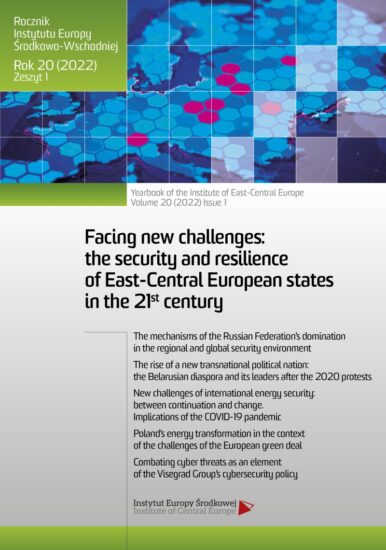Powstanie nowego transnarodowego narodu politycznego: białoruska diaspora i jej liderzy po protestach 2020 roku
ORCID: Kseniya Homel: 0000-0001-6893-780X
Edition: Lublin 2022
DOI: https://doi.org/10.36874/RIESW.2022.1.3
Citation method: M. Jaroszewicz, M. Lesińska, K. Homel, The rise of a new transnational political nation: the Belarusian diaspora and its leaders after the 2020 protests, „Rocznik Instytutu Europy Środkowo-Wschodniej” 20(2022), z. 1, s. 35-56, DOI: https://doi.org/10.36874/RIESW.2022.1.3.
Keywords: Belarus, democratic transformation, diaspora, nationhood
Abstract:
When an authoritarian country lacks opportunities for free political activity, the diaspora and its leaders often take on the role of the democratic opposition against the authoritarian government and act as a political force for democratization. Although political activity abroad is very challenging and limited per se, the example of the Belarusian diaspora and its leaders demonstrates that they can play the role of an internationally recognized political entity. The pro-democratic activity of the Belarusian diaspora focuses on three main areas: the continuation of resistance against the authoritarian regime, the advancement of political representation, and the development of a credible democratic alternative including a political program for a future democratic Belarus. Yet the Russian aggression against Ukraine has put Belarusian opposition abroad at the front of a dilemma as to whether they should also take on a clear nation-building in the new geopolitical context.
Bibliography:
Akudovich V., The code of absence [Код адсутнасці], Minsk 2007.
Bedford S., Vinatier L., Resisting the Irresistible: “Failed Opposition” in Azerbaijan and Belarus Revisited, “Government and Opposition” 2019, vol. 54, no. 4.
Bekus N., Struggle over identity: The official and the alternative “Belarusianness”, Central European University Press 2010.
Bekus N., Echo of 1989? Protest Imaginaries and Identity Dilemmas in Belarus, “Slavic Review” 2021, vol. 80, no. 1.
Boix C., Stokes S., Endogenous democratization, “World Politics” 2003, vol. 55, no. 4.
Brubaker R., The “diaspora” diaspora, “Ethnic and Racial Studies” 2005, vol. 28, no. 1.
Coordination Council, The concept of law reinstatement and national reconciliation, March 2021, https://rada.vision/en/the-concept.
Dahl R., On Democracy: A Citizen’s Guide, New Haven 2000.
Douglas N., Belarus: From the Old Social Contract to New Social Identity, “ZOiS Report” 2020, vol. 6, https://en.zois-berlin.de/file-admin/media/Dateien/3 Publikationen/ZOiS_Reports/2020/ZOiS_Report_6_2020.pdf.
Greene S.A., You are what you read: media, identity, and community in the 2020 Belarusian uprising, “Post-Soviet Affairs” 2022, vol. 38, no. 1-2.
Kazharski A., Belarus’ new political nation? 2020 anti-authoritarian protests as identity building, “New Perspectives” 2021, vol. 29, no. 1.
Kłysiński K., Belarus: formation of Tsikhanouskaya’s interim cabinet, Analyses of OSW Centre for Eastern Studies, 10 August 2022, https://www.osw.waw.pl/en/publikacje/analyses/2022-08-10/belarus-formation-tsikhanouskayas-interim-cabinet.
Koinova M., Diasporas and democratization in the post-communist world, “Communist and Post-Communist Studies” 2009, vol. 42, no. 1.
Kuzio T. Transition in Post-Communist States. Triple or Quadruple?, “Contemporary Politics” 2001, vol. 21, no. 3.
Lahvinets A., Papko A., Unfinished Business. Challenges for Belarus on its Way to Democracy, “European View” 2010, vol. 9, no. 2.
Levitsky S., Way L.A., Competitive Authoritarianism: Hybrid Regimes After the Cold War, Cambridge 2010.
Linz J., Stepan A., Problems of Democratic Transition and Consolidation: Southern Europe, South America and post-Communist Europe, Baltimore 1996.
Linz J.L., Stepan A., Toward Consolidated Democracies, “Journal of Democracy” 1996, vol. 7, no. 2.
National Anti-Crisis Management, March 2022, https://belarus-nau.org/by#rec447619916.
“New Belarus” conference, Draft declaration on the aims and values of the Belarusian democratic forces, Vilnius, 9 August 2022, https://conferencenewbelarus.org/declaracija.
Pérez-Díaz V.M., The Return of Civil Society. The Emergence of Democratic Spain, Cambridge 1993.
Petrova I., Korosteleva E., Societal fragilities and resilience: The emergence of peoplehood in Belarus, “Journal of Eurasian Studies” 2021, vol. 2, no. 2.
Radio Free Liberty Europe, EU does not recognize Lukashenko as Belarusian President, Borell Says, 15 September 2020, https://www.rferl.org/a/eudoes-not-recognize-Lukashenko-borrell-says/30840563.html.
Rudkouski P., Powstawanie Białorusi, Wrocław 2009.
Shchyttsova T., Overcoming authoritarianism: path-dependency and new citizenship, in Overcoming authoritarianism: Belarus and the Eastern European Region 30 years later, “Topos Journal for Philosophy and Cultural Studies” 2021, vol. 2.
Shain Y., The Frontier of Loyalty. Political Exiles in the Age of the Nation-State, University of Michigan Press, 2005.
Sierakowski S., Belarus Uprising: The Making of a Revolution, “Journal of Democracy” 2022, vol. 31, no. 4.
Silitski V., Preempting democracy. The case of Belarus, “Journal of Democracy” 2005, vol. 26, no. 4.
Stepan A., Democratic Opposition and Democratization Theory, “Government and Opposition” 1997, vol. 32, no. 4.
Sviatlana Tsikhanouskaya declared herself as the national leader of Belarus, 24 February 2022, https://tsikhanouskaya.org/en/events/news/ca51ca6ec0f8686.html.
Sviatlana Tsikhanouskaya announced the United Transitional Cabinet and named its first members, 9 August 2022, https://tsikhanouskaya.org/en/events/news/e1e57cee6d4a3a9.html.
White D., Political opposition in Russia: the challenges of mobilisation and the political-civil society nexus, “East European Politics” 2015, vol. 31, no. 3.
Wnuk-Lipiński E., Civil Society and Democratization, [in:] The Oxford Handbook of Political Behavior, R.J. Dalton, H.D. Klingemann (eds.), Oxford 2007.
World Belarus Congress 2020, https://belarusabroad.org/en/world-belarus-congress-2020/.

PDF: Download